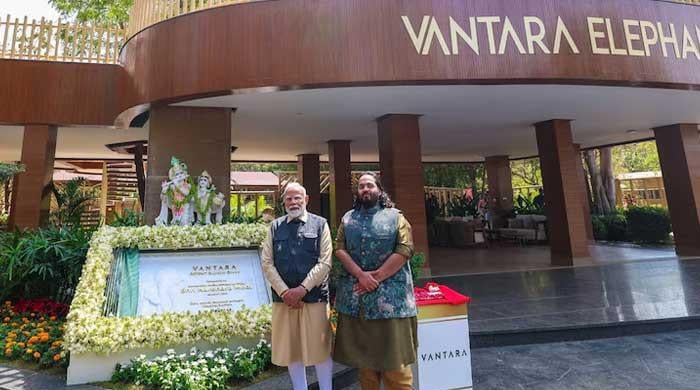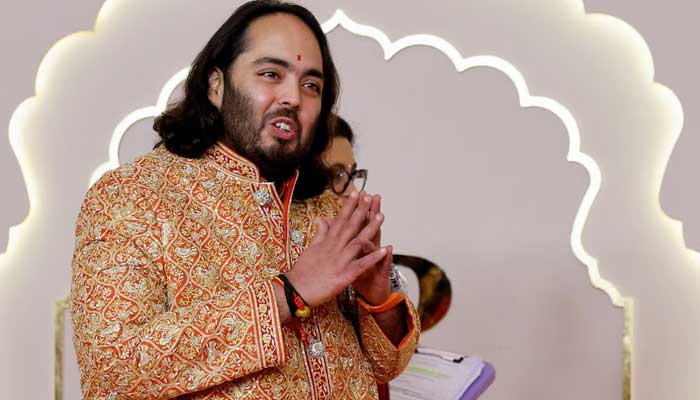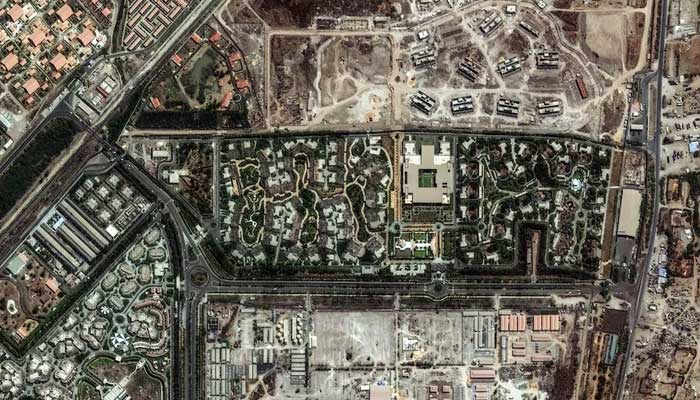Entertainment
New Delhi urges UN body not to restrict imports of animals by Ambani zoo

NEW DELHI: India has urged a UN wildlife trade body not to curb its imports of endangered species, saying it has tightened oversight amid growing allegations of irregular animal shipments to a large private zoo run by Asia’s richest family.
Vantara, a 3,500-acre zoo in Gujarat state run by the philanthropic arm of a conglomerate led by billionaire Mukesh Ambani and his family, has faced allegations of improper imports of certain animals, triggering higher scrutiny from authorities in Germany and the European Union, Reuters has reported.
Indian investigators tasked by the country’s Supreme Court to examine the allegations by non-profit and wildlife groups cleared the sanctuary of any wrongdoing in September, and Vantara has said it complies with all regulations.

However, after visiting the facility in September, the Secretariat of the Convention on International Trade in Endangered Species of Wild Fauna and Flora (Cites) issued a report last week asking India to review its procedures.
The report cited discrepancies between exporter and importer trade data and flagged insufficient checks on the origin of some animals.
In a submission to Cites dated November 10, India said any restrictive or punitive measure at this stage would lack legal foundation and risk unsettling the Cites framework, calling the measure “premature and disproportionate”.
The wildlife body’s request “would constitute a de facto suspension or moratorium on lawful” imports, the government said.
The Indian submission, posted on the Cites website ahead of its convention meeting this month, is first being reported by Reuters. It signals new wrangling over Vantara’s imports.
‘Exceptionally high standards’
Cites is a global treaty that regulates trade in endangered plants and animals, or products derived from them, with the aim of ensuring their survival.
While Cites acknowledged last week that Vantara operates facilities of “exceptionally high standards,” it recommended that India halt new import permits for endangered species until safeguards are tightened.
The body warned that without stricter checks, animals sourced from the wild could be misrepresented as captive-bred.

India countered that it “has strengthened inspection and reporting mechanisms for all recognised zoos and rescue facilities” including Vantara. The government also instructed the Central Zoo Authority to ensure enhanced due diligence for all future acquisitions.
Cites and Vantara did not respond to a Reuters request for comment on the Indian government’s submission on Wednesday.
Vantara — home to 2,000 species
Vantara says it is home to some 2,000 species. That includes imported exotic species from South Africa, Venezuela, and the Democratic Republic of Congo, including snakes, tortoises, tigers, cheetahs, giraffes and chimpanzees.
The shipments were recorded with a declared value of $9 million, which Vantara has said reflected freight and insurance charges, not any payments for wildlife.
The Cites report last week noted that “a number of animals come from established commercial breeding facilities, which would normally sell the animals they breed”.
India has mounted a defence, saying in response that the SC panel’s findings showed imports were carried out in compliance with regulations.
Entertainment
China’s humanoid robots take centre stage for Lunar New Year showtime

China’s most-watched TV show, the annual CCTV Spring Festival gala, on Monday showcased the country’s cutting-edge industrial policy and Beijing’s push to dominate humanoid robots and the future of manufacturing.
Four rising humanoid robot startups — Unitree Robotics, Galbot, Noetix and MagicLab — demonstrated their products at the gala, a televised event and touchstone for China comparable to the Super Bowl for the United States.
The programme’s first three sketches prominently featured humanoid robots, including a lengthy martial arts demonstration where over a dozen Unitree humanoids performed sophisticated fight sequences, waving swords, poles and nunchucks in close proximity to human children performers.
The fight sequences included a technically ambitious one that imitated the wobbly moves and backward falls of China’s “drunken boxing” martial arts style, showing innovations in multi-robot coordination and fault recovery — where a robot can get up after falling down.
The programme’s opening sketch also prominently featured Alibaba’s AI chatbot Doubao, while four Noetix humanoid robots appeared alongside human actors in a comedy skit, and MagicLab robots performed a synchronised dance with human performers during the song “We Are Made in China”.
Ipos planned
The hype surrounding China’s humanoid robot sector comes as major players including AgiBot and Unitree prepare for initial public offerings this year, and domestic artificial intelligence startups release a raft of frontier models during the lucrative nine-day Lunar New Year public holiday.
Last year’s gala stunned viewers with 16 full-size Unitree humanoids twirling handkerchiefs and dancing in unison with human performers.
Unitree’s founder met President Xi Jinping weeks later at a high-profile tech symposium – the first of its kind since 2018.
Xi has met five robotics startup founders in the past year, comparable to the four electric vehicle and four semiconductor entrepreneurs he met in the same timeframe, giving the nascent sector unusual visibility.
The CCTV show, which drew 79% of live TV viewership in China last year, has for decades been used to highlight Beijing’s tech ambitions, including its space programme, drones and robotics, said Georg Stieler, Asia managing director and head of robotics and automation at technology consultancy Stieler.
“What distinguishes the gala from comparable events elsewhere is the directness of the pipeline from industrial policy to prime-time spectacle,” Stieler said.
“Companies that appear on the gala stage receive tangible rewards in government orders, investor attention, and market access.”
China’s strengths
Behind the spectacle of robots running marathons and executing kung-fu kicks and backflips, China has positioned robotics and AI at the heart of its next-generation AI+ manufacturing strategy, betting that productivity gains from automation will offset pressures from its ageing workforce.
“Humanoids bundle a lot of China’s strengths into one narrative: AI capability, hardware supply chain, and manufacturing ambition. They are also the most ‘legible’ form factor for the public and officials,” said Beijing-based tech analyst Poe Zhao.
“In an early market, attention becomes a resource.”
China accounted for 90% of the roughly 13,000 humanoid robots shipped globally last year, far ahead of US rivals including Tesla’s Optimus, according to research firm Omdia.
Morgan Stanley projects that China’s humanoid sales will more than double to 28,000 units this year.
Elon Musk has said he expects his biggest competitor to be Chinese companies as he pivots Tesla toward a focus on embodied AI and its flagship humanoid Optimus.
“People outside China underestimate China, but China is an ass-kicker next level,” Musk said last month.
Entertainment
Cardi B flaunts tattoos after onstage fall during Little Miss drama tour

Cardi B brought her signature bold style to the stage as her Little Miss Drama tour continues to sell out arenas.
The rapper stunned fans in a hot pink dress featuring a daring high slit, a plunging neckline, and subtle side cutouts that highlighted her tattoos while adding a sensuous edge to the look.
The Bodak Yellow hitmaker took to Instagram to put up a video of herself posing to Rihanna’s James Joint.
The clip instantly became viral.
Fans praised her confidence and glamour, with many commenting on how “pretty” she looked and applauding her fearless fashion choices.
Her striking outfit came around the time the rapper made headlines for her fall on stage at her tour stop in Las Vegas.
While performing her track Thotiana at T Mobile Arena on February 13, the rapper took a tumble off a chair mid routine.
The fall was minor, but Cardi quickly turned it into a viral moment with her trademark humor.
After finishing the song, she quipped to the crowd, “That was the government!” which was a playful jab that came after she had recently traded words online with the Department of Homeland Security.
Entertainment
Kate Hudson gushes about son Ryder's journey and career move

Kate Hudson’s next chapter feels both familiar and deeply personal as she watches her family’s love for the craft continue to grow.
Source link
-

 Business6 days ago
Business6 days agoAye Finance IPO Day 2: GMP Remains Zero; Apply Or Not? Check Price, GMP, Financials, Recommendations
-

 Fashion6 days ago
Fashion6 days agoComment: Tariffs, capacity and timing reshape sourcing decisions
-

 Tech6 days ago
Tech6 days agoRemoving barriers to tech careers
-

 Fashion6 days ago
Fashion6 days agoADB commits $30 mn to support MSMEs in Philippines
-

 Entertainment6 days ago
Entertainment6 days ago‘Harry Potter’ star David Thewlis doesn’t want you to ask him THIS question
-

 Sports6 days ago
Sports6 days agoWinter Olympics opening ceremony host sparks fury for misidentifying Mariah Carey, other blunders
-

 Fashion6 days ago
Fashion6 days agoSaint Laurent retains top spot as hottest brand in Q4 2025 Lyst Index
-

 Fashion4 days ago
Fashion4 days ago$10→ $12.10 FOB: The real price of zero-duty apparel






